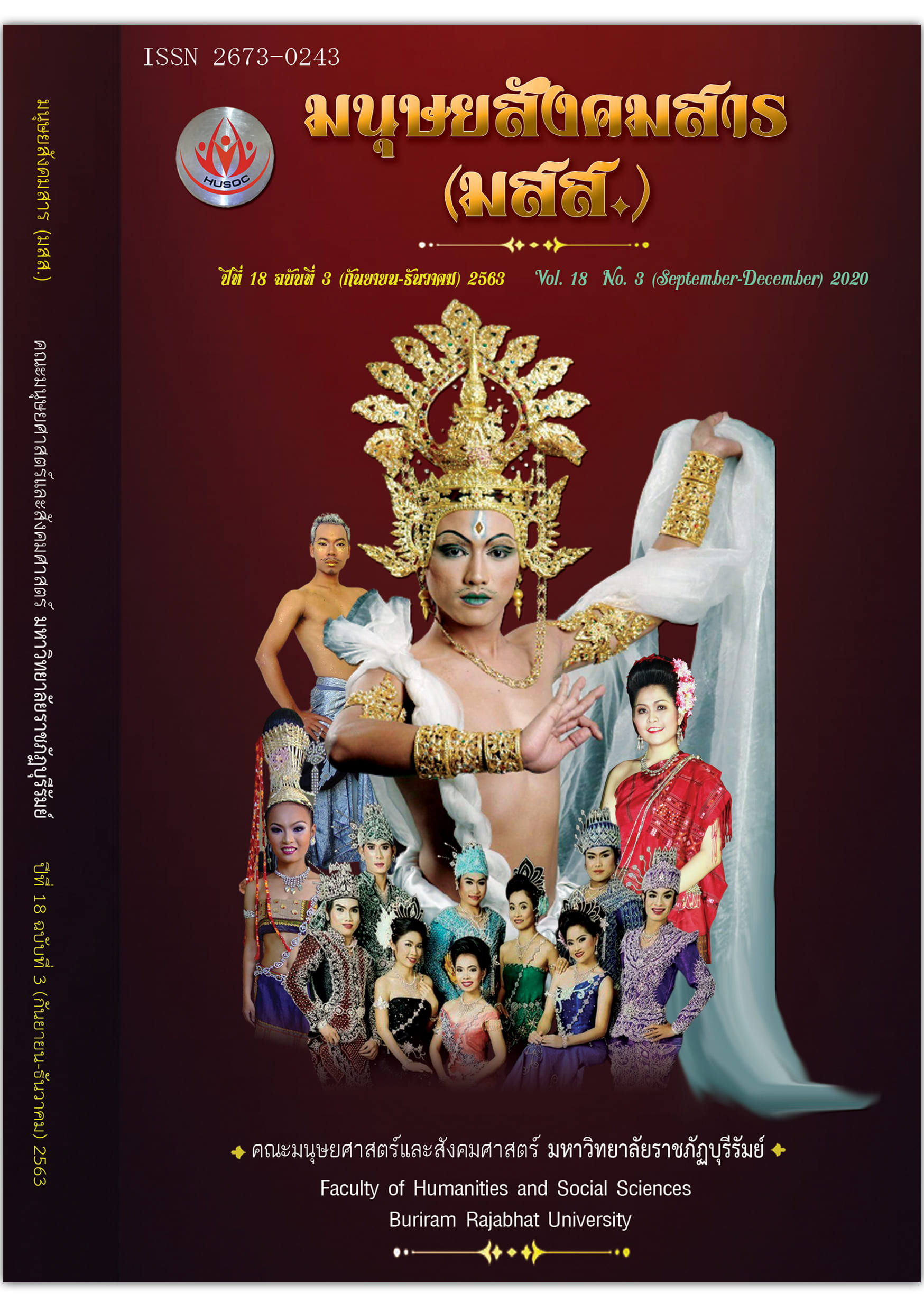The Relationship of Digital Post-Purchase Brand Touchpoints on Relationship Quality and Self-Brand Connection in the Context of Repurchase of an Automobile
Main Article Content
บทคัดย่อ
The purpose to investigate the effect of dimensions of digital post-purchase touchpoints on the relationship quality and the self-brand connection within the repurchase of the automobile. Survey research with a structured questionnaire was used for collection. The target population was all current users of the medium segment of a passenger car in Thailand. The sample of this study was male and female, age 18-60 years old, living in Bangkok and its vicinities who bought Toyota Camry or Honda Accord between 2014 and 2018. Factor analysis was used to classify digital post-purchase touchpoints into dimensions. SEM was used to test the relationship between types of digital post-purchase touchpoints and relationship quality, as well as self-brand connection. The rotated solution yielded 3 interpretable factors which includes information-based, interaction-based, and service-based digital post-purchase touchpoints. Structural equation modelling (SEM) indicated that the model was a good fit to data. The predictor were able to account for 15% of the variance in relationship quality, whereas it accounts for 8.5% of the variance in self-brand connection. Interaction-based and service-based digital post-purchase touchpoints have effects on relationship quality and self-brand connection. However, information-based digital post-purchase touchpoints didn't have a direct effect on relationship quality and self-brand connection.
Article Details
เนื้อหาและข้อมูลในบทความที่ลงตีพิมพ์ในวารสารทดสอบระบบ ThaiJo2 ถือเป็นข้อคิดเห็นและความรับผิดชอบของผู้เขียนบทความโดยตรงซึ่งกองบรรณาธิการวารสาร ไม่จำเป็นต้องเห็นด้วย หรือร่วมรับผิดชอบใดๆ
บทความ ข้อมูล เนื้อหา รูปภาพ ฯลฯ ที่ได้รับการตีพิมพ์ในวารสารทดสอบระบบ ThaiJo2 ถือเป็นลิขสิทธิ์ของวารสารทดสอบระบบ ThaiJo2 หากบุคคลหรือหน่วยงานใดต้องการนำทั้งหมดหรือส่วนหนึ่งส่วนใดไปเผยแพร่ต่อหรือเพื่อกระทำการใดๆ จะต้องได้รับอนุญาตเป็นลายลักอักษรจากวารสารทดสอบระบบ ThaiJo2 ก่อนเท่านั้น
เอกสารอ้างอิง
Baxendale, S., Macdonald, E. & Wilson, H. (2015). The impact of different touchpoints on brand consideration. Journal of Retailing. https://doi.org/91. 10.1016/j.jretai.2014.12.008.
Bentler, P. & Chou, C. (1987). Practical issues in structural equation modeling. Sociological Methods & Research, 16. https://doi.org/10.1177/0049124187016001004.
Chaudhuri, A. & Holbrook, B. M. (2001). The chain of effects from brand trust and brand affect to brand performance: The role of brand loyalty. Journal of marketing, 65, 81-93. https://doi.org/10.1509/jmkg.65.2.81.18255.
Cook, G. (2014). Customer experience in the omni-channel world and the challenges and opportunities this presents. Journal of Direct Data Digital Marketing Practice, 15, 262–266. https://doi.org/10.1057/dddmp.2014.16
Crosby, L., Evans, K. & Cowles, D. (1990). Relationship quality in services selling: An interpersonal influence perspective. Journal of Marketing, 54(July), 68-81.
Dunn, M. & Davis, S. (2004). Creating the brand-driven business: it’s the CEO who must lead the way. Handbook of Business Strategy, 241-245.
Edwards, H. (2009). Who’s fighting for your brand?, Bank Marketing, 41(1), 38-42.
Escalas, J. E. (2004). Narrative Processing: Building Consumer Connections to Brands. Journal of Consumer Psychology, 14 (1&2), 168-180.
Escalas, J. E. & Bettman, J. R. (2003). You are what they eat: The influence of reference groups on consumers’ connections to brands. Journal of Consumer Psychology, 13(3), 339–348.
Hallikainen, H., Alamäki, A. & Laukkanen, T. (2018). Individual preferences of digital touchpoints: A latent class analysis. Journal of Retailing and Consumer Services. https://doi.org/10.1016/j.jretconser.2018.07.014.
Hapsari, L. & Adiwijaya, M. (2014). The Relationship between self-congruity, brand relationship quality, and brand loyalty. Asian Journal of Business Research, 4. https://doi.org/10.14707/ajbr.140008.
Hazel, H. H. & Vincent-Wayne, M. (2013). Self-brand connection: The role of achievement and brand conscious in public versus private consumption situations. Paper presented at 8th Global Brand Conference of the Academy of Marketing’s Brand, Identity and Corporate Reputation Special Interest Group, Catholic University Porto, Portugal.
Kemp, S. (2020). Digital 2020: Thailand - Data Reportal – Global Digital Insights. Retrieved from https://datareportal.com/reports/digital-2020-thailand
Kempeners, M. (1995). Relationship quality in business-to-business relationships. Proceedings of the 11th IMP Conference, 3, 1629-1639.
Kim, Yu., Ko, Yong Jae. & James, Jeffrey. (2011). The impact of relationship quality on attitude toward a sponsor. Journal of Business & Industrial Marketing, 26, 566 - 576.
Languepin, O. (2013). Thailand poised to surpass car production target. Thailand Business News. Archived from the original on 15 January 2013. Retrieved on 20 January 2013.
Lin, J., Lobo, A. & Leckie, C. (2017). The role of benefits and transparency in shaping consumers’ green perceived value, self-brand connection and brand loyalty. Journal of Retailing and Consumer Services, 35. https://doi.org/10.1016/j.jretconser.2016.12.011.
Loureiro, S., Kaufmann, H. & Vrontis, D. (2012). Brand emotional connection and loyalty. Journal of Brand Management, 20. https://doi.org/13. 10.1057/bm.2012.3.
Maikaew, P. (2018). FTI upbeat on local car sales in 2018. Retrieved on 13February 2019 from http://www.thaiauto.or.th/2012/news/news-detail.asp?news_id=4031
Marco, I. & Cristina, Z. (2017). The interplay between customer experience and customer loyalty: Which touchpoints matter?. Proceedings of the 20th Excellence in Services International Conference, University of Verona, 2017. Verona: Italy.
Mårtenson, R. (2008). Marknadskommunikation. Kunden. Varumärket. Lönsamheten., Test edition HGU, Studentlitteratur, Sweden.
McFarland, C. & Buehler, R. (1998). The impact of negative affect on autobiographical memory: The role of self-focused attention to moods. Journal of Personality and Social Psychology, 75(6), 1424–1440. DOI: https://doi.org/10.1037/0022-3514.75.6.1424.
Nunnally, Jum C. (1967). Psychometric Theory, 1st ed., New York: McGraw-Hill.
Popjanev, I. (2016). Managing customer loyalty in the automotive industry using six sigma and “the Toyota way” methodology. MEST Journal, 4, 99-110. https://doi.org/10.12709/mest.04.04.01.10. 3.2 Research Design.
Raykov, T. & Marcoulides, G. A. (2006). A first course in structural equation modeling (2nd ed.). Lawrence Erlbaum Associates Publishers.
Şahin, A., Zehir, C. & Kitapci, H. (2012). The effects of brand experience and service quality on repurchase intention: The role of brand relationship quality. African Journal of Business Management, 6. https://doi.org/10.5897/AJBM11.2164.
Suthongwan, S. & Kuntonbutr, C. (2020). The influence of traditional post-purchase brand touchpoints on relationship quality and self-brand connection: A case study of automobile repurchase in Thailand. In the 15th International Sripatum University Conference (SPUCON2020) on Research and Innovations to Sustainable Development.
Thailand Automotive Statistics. (2019). Thailand automotive industry overview [market analysis]. (2018, January 24). Retrieved on 13 February 2019 from https://aseanup.com/thailand-automotive-industry-overview/
Van Der Westhuizen, L. M. (2018). “Brand loyalty: exploring self-brand connection and brand experience”. Journal of Product & Brand Management, 27(2), 172-184. https://doi.org/10.1108/JPBM-07-2016-1281.


